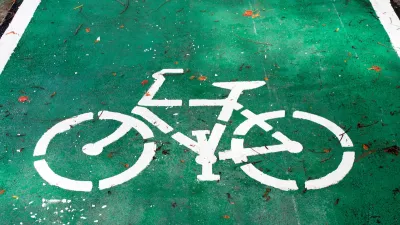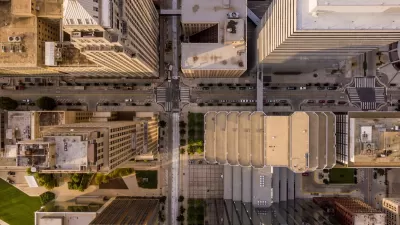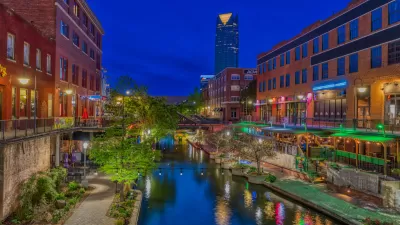According to Steve Lackmeyer, traditional highway design, aimed at the automobile, is clashing with modern urban planning trends, of 'complete streets' and multi-modes, over a new proposal to build an elevated highway in Oklahoma City.
If you've paid any attention to recent trends in urban highways, you'd guess that there was a universal shift from construction, to demolition, of America's urban highways. Well, one city is bucking that trend entirely. Engineers at the Oklahoma Department of Transportation, seeking to cater to a growing volume of motorists, are looking to complete a decades old plan for an elevated highway in Downtown Oklahoma City.
"Now, as state highway engineers are about to let out construction bids for the road, they're encountering a buzz-saw of criticism that the road will kill development south of the road by Classen Boulevard and will recreate the old highway barriers that blighted the area a half-century ago," reports NewsOK's Steve Lackmeyer.
The highway proposal, dating from the 1990s, represents a much different time in Oklahoma City's history. Lackmeyer cites the city's new downtown development - like Devon Energy Center, Bricktown Ballpark, and the Bricktown Canal - that didn't exist at the time of the highway's initial proposition. Additionally, some argue the highway represents an old way of thinking about roadway design, and that urban transportation policy has evolved to include all forms of transportation, not just catering to the automobile. Hence any plans to change roads in the city, they argue, should consider a multi-modal approach.
From a bigger picture point-of-view, the highway signifies another lasting aspect of transportation planning in America, that of regional interests conflicting with local interest. The current Mayor, and many citizens, have adamantly fought against the proposal, some as far back as its initial unveiling. Still, state officials and city engineers continue to pitch their case for the elevated highway.
FULL STORY: Boulevard fight represents divide between traditional road design, modern urban planning

Alabama: Trump Terminates Settlements for Black Communities Harmed By Raw Sewage
Trump deemed the landmark civil rights agreement “illegal DEI and environmental justice policy.”

Planetizen Federal Action Tracker
A weekly monitor of how Trump’s orders and actions are impacting planners and planning in America.

The 120 Year Old Tiny Home Villages That Sheltered San Francisco’s Earthquake Refugees
More than a century ago, San Francisco mobilized to house thousands of residents displaced by the 1906 earthquake. Could their strategy offer a model for the present?

Ken Jennings Launches Transit Web Series
The Jeopardy champ wants you to ride public transit.

BLM To Rescind Public Lands Rule
The change will downgrade conservation, once again putting federal land at risk for mining and other extractive uses.

Indy Neighborhood Group Builds Temporary Multi-Use Path
Community members, aided in part by funding from the city, repurposed a vehicle lane to create a protected bike and pedestrian path for the summer season.
Urban Design for Planners 1: Software Tools
This six-course series explores essential urban design concepts using open source software and equips planners with the tools they need to participate fully in the urban design process.
Planning for Universal Design
Learn the tools for implementing Universal Design in planning regulations.
Clanton & Associates, Inc.
Jessamine County Fiscal Court
Institute for Housing and Urban Development Studies (IHS)
City of Grandview
Harvard GSD Executive Education
Toledo-Lucas County Plan Commissions
Salt Lake City
NYU Wagner Graduate School of Public Service





























